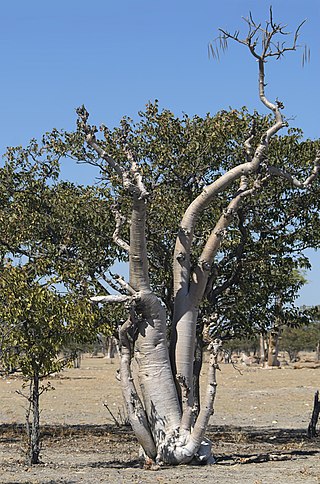
Action Against Hunger is a global humanitarian organization which originated in France and is committed to ending world hunger. The organization helps malnourished children and provides communities with access to safe water and sustainable solutions to hunger.

The tree of life is a fundamental archetype in many of the world's mythological, religious, and philosophical traditions. It is closely related to the concept of the sacred tree. The tree of knowledge connecting to heaven and the underworld such as Yggdrasil and the tree of the knowledge of good and evil in Genesis, and the tree of life, connecting all forms of creation, are forms of the world tree or cosmic tree, and are portrayed in various religions and philosophies as the same tree.

The Arbor Day Foundation is an American 501(c)(3) nonprofit membership organization dedicated to planting trees. The Arbor Day Foundation has more than one million members and has planted more than 500 million trees in neighborhoods, communities, cities and forests throughout the world. The Foundation's stated mission is "to inspire people to plant, nurture, and celebrate trees."

Cashew is the common name of a tropical evergreen tree Anacardium occidentale, in the family Anacardiaceae. It is native to South America and is the source of the cashew nut and the cashew apple, an accessory fruit. The tree can grow as tall as 14 metres, but the dwarf cultivars, growing up to 6 m (20 ft), prove more profitable, with earlier maturity and greater yields. The cashew nut is edible and is eaten on its own as a snack, used in recipes, or processed into cashew cheese or cashew butter. The nut is often simply called a 'cashew'.

Reforestation is the practice of restoring previously existing forests and woodlands that have been destroyed or damaged. The prior forest destruction might have happened through deforestation, clearcutting or wildfires. Three important purposes of reforestation programs are for harvesting of wood, for climate change mitigation, and for ecosystem and habitat restoration purposes. One method of reforestation is to establish tree plantations, also called plantation forests. They cover about 131 million ha worldwide, which is 3% of the global forest area and 45% of the total area of planted forests.

Citrus production encompasses the production of citrus fruit, which are the highest-value fruit crop in terms of international trade. There are two main markets for citrus fruit:

Moringa is the sole genus in the plant family Moringaceae. It contains 13 species, which occur in tropical and subtropical regions of Africa and Asia and that range in size from tiny herbs to massive trees. Moringa species grow quickly in many types of environments.

The tamarillo is a tree or shrub in the flowering plant family Solanaceae. It bears the tamarillo, an egg-shaped edible fruit. It is also known as the tree tomato, tomate de árbol, tomate andino, tomate serrano, blood fruit, poor man's tomato, tomate de yuca, tomate de españa, sachatomate, berenjena, chilto and tamamoro in South America, tyamtar, rambheda or rukh tamatar in Nepal, and terong Belanda in Indonesia. It is popular globally, especially in Peru, Colombia, New Zealand, Ecuador, Nepal, Rwanda, Burundi, Australia, and Bhutan.

The Mata Amritanandamayi Math (MAM) is an international charitable organization aimed at the spiritual and material upliftment of humankind. It was founded by Indian spiritual leader and humanitarian Mata Amritanandamayi in 1981, with its headquarters in Paryakadavu, Alappad Panchayat, Kollam district, kerala and is also known as amritpuri

Borassus is a genus of five species of fan palms, native to tropical regions of Africa, Asia, and Papua New Guinea.

Moringa oleifera is a fast-growing, drought-resistant tree of the family Moringaceae, native to the Indian subcontinent and used extensively in South and Southeast Asia. Common names include moringa, drumstick tree, horseradish tree, or malunggay.
Opportunity International is a 501(c)(3) nonprofit organization chartered in the United States. Through a network of 47 program and support partners, Opportunity International provides small business loans, savings, insurance and training to more than 14 million people in the developing world. It has clients in more than 20 countries and works with fundraising partners in the United States, Australia, Canada, Germany, Switzerland, Singapore, Hong Kong and the United Kingdom. Opportunity International has 501(c)(3) status as a tax-exempt charitable organization in the United States under the US Internal Revenue Code.

The Kinnow is a high yield mandarin hybrid cultivated extensively in the wider Punjab region of India and Pakistan.
Van Mahothsavlit. 'Forest festival', is an annual one-week tree-planting festival in India which is celebrated in the first week of July. It is a great traditional Indian festival that reflects Indian culture and heritage to honor and love mother earth by planting trees, by creating awareness of nature's beauty, and by fostering an environment to promote the concept of reduce, reuse, and recycle. The words “Van” and “Mahotsav” are derived from Sanskrit language. “Van” which can also be spelled as “Vana” refers to “Forest”, and “Mahotsav” is a combination of “Maha” meaning great and “Utsav” meaning festival. So the literal meaning of “Van Mahotsav” can be deduced to “A Great Forest-Festival”, an event which is celebrated by the Indian community throughout the world with the central theme of planting trees.

TechnoServe is an international nonprofit that promotes business solutions to poverty in the developing world by linking people to information, capital and markets. It is a registered 501(c)(3) based in Washington, D.C., with over 1,540 employees across 29 countries worldwide.

Pomegranate production in Afghanistan is a significant contributor to the country's agricultural economy. It likely existed in the country since ancient time. Pomegranates are a major fruit crop in many provinces, particularly in Kandahar, Helmand, Wardak, Ghazni, Paktia, Farah, Kapisa and Balkh, and are the source of the livelihoods of thousands of people.

Moringa stenopetala, commonly known as the African Moringa or cabbage tree, is a deciduous tree in the plant genus Moringa, native to Kenya and Ethiopia. A drought-resistant species, it is characterized by its bottle-shaped trunk, long twisted seed pods, and edible leaves likened to cabbage, from which its common name is derived. M. stenopetala is extirpated in the wild in Ethiopia, though still grown there as a crop on the terraces of the Ethiopian Highlands, mainly in the Konso region.
Kaukab Noorani Okarvi is a Pakistani religious scholar and writer of Ahle-Sunnat Wa Jamaa’at Sunni. He is the son of Muhammad Shafee Okarvi, who was the founder of the Jamaat Ahle Sunnat, the main Barelvi organisation of Pakistan.

Daripalli Ramaiah is an Indian social worker known for his social forestry initiatives. He is the recipient of the Padma Shri award for the year 2017, for his invaluable contribution to extending tree cover. He is locally known as 'Chetla Ramaiah',. On a mission to bring back the green cover, he is estimated to have planted more than 100 thousand saplings in and around Khammam district with a thrust on trees that provide shade, fruit-bearing plants, and biodiesel plants with assured benefit to future generations.
Plant for Pakistan (Plant4Pakistan), also known as 10 Billion Tree Tsunami, was a five-year project to plant 10 billion trees across Pakistan from 2018 to 2023. Prime Minister Imran Khan started the drive on 2 September 2018 with approximately 1.5 million trees planted on the first day. The campaign was based on the successful Billion Tree Tsunami campaign of the former Pakistan Tehreek-e-Insaf government, also led by Imran Khan, in the province of Khyber Pakhtunkhwa in 2014. This different initiative is often confused with the initiative of the Prime Minister Mian Muhammad Nawaz Sharif who launched a national campaign of Green Pakistan and also allocated budget funding from the PSDP.